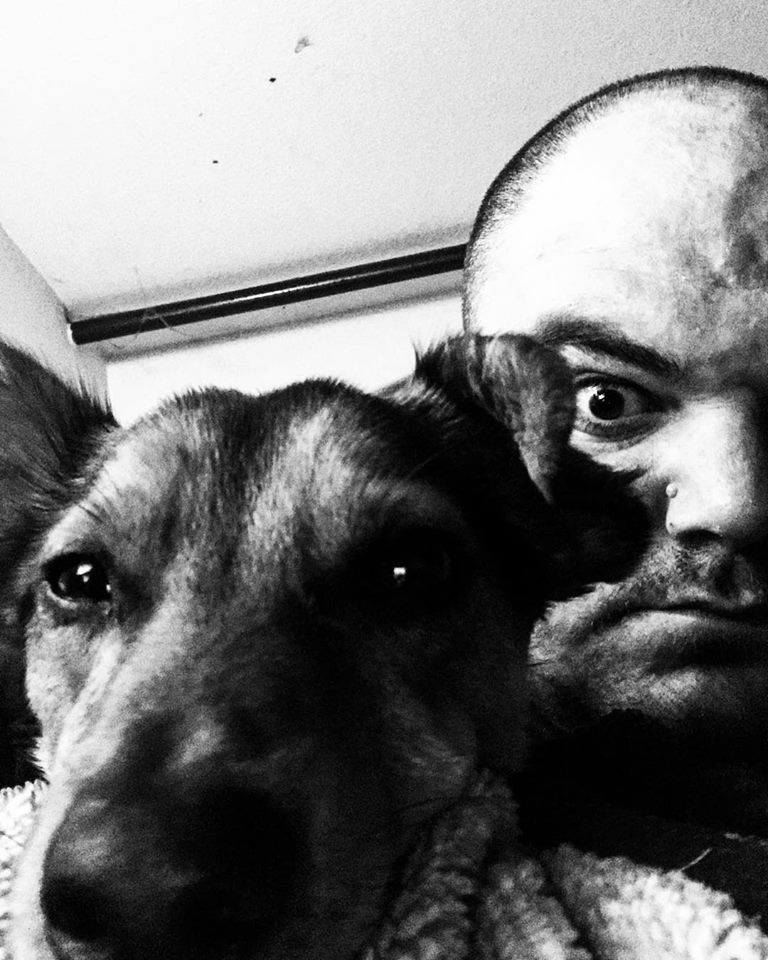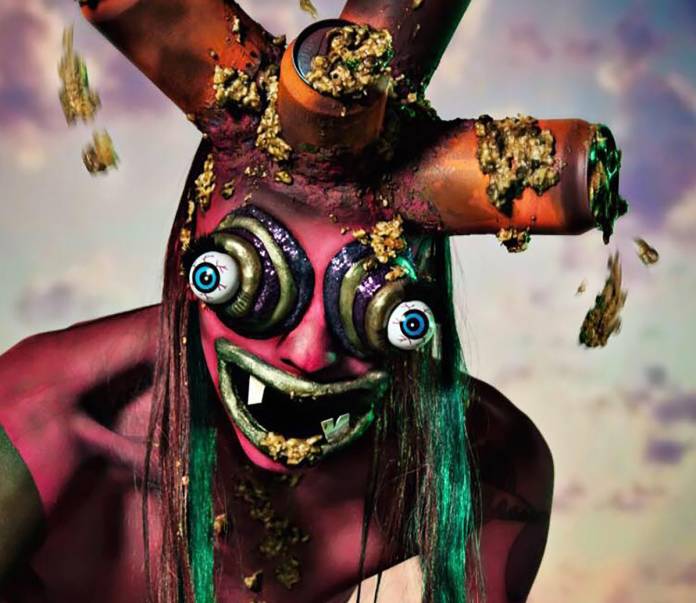ALL EARS Michael Daddona never thought he’d own a dog.
“What’s a dog even gonna do at a noise show?” he asks. “Or sit around while I’m tinkering with electronics? They’re gonna hate it.”
But when a stray dog wandered into his house, flopped down on the couch and made itself at home, what could he do? “I guess I have a dog,” he figured. Blade is now sort of the unofficial dog of Ratskin Records, the experimental label Daddona co-founded in 2003.
Sudden, no-turning-back decisions seem to be a constant in Daddona’s life. A week before the dog showed up, Ratskin co-founder, Jsun McCarty, died in the Ghost Ship warehouse fire that took 36 lives in Oakland in 2016. Daddona knew and had worked with many of the deceased, and he almost shut the label down: “I think I just felt so overwhelmed and confused I didn’t feel physically I could even really think about that kind of stuff,” he says.
But he soldiered on—“and that was kinda when I decided I was gonna do [Ratskin] for the rest of my life,” he says. “I don’t really believe in destiny, but I’m good enough at it, and it brings me enough passion that I think it’s worthwhile.”
Ratskin released mostly noise music early on but quickly expanded to acommodate artists across the the experimental spectrum, many of whom are women or people of color. The label’s become known for its gargantuan compilations: 2008’s Triskaidekaphobia—a 200-song album of 13-second songs by assorted artists—and the 10-disc, 183-song Ghost Ship benefit Rogue Pulse/Gravity Collapse. This weekend, Fri/7-Sun/9, Ratskin is curating Stasis: A Festival of Sound, Performance, Video, and Art at Pro Arts Gallery in Oakland, featuring dozens of participants including Auscultation, Las Sucias, Piano Rain, and E. Hernandez.
Daddona lives in Oakland but maintains a day job at a homebrew supply shop in San Francisco’s Richmond District. Amid the frenzied barking of Blade and several other shop dogs, we met up with Daddona to discuss the now nearly 15-year-old label and the practicality of running a small experimental label in the Bay Area, hardly the friendliest place for DIY artists.
48HILLS: How’d you get your start in music?
MICHAEL DADONNA I grew up in the hardcore/metalcore scene in Connecticut. Most of the shows were at this place called the Hanover House [in Meriden, CT], which was this old Hell’s Angels bar. On one side was the Hell’s Angels bar where the bathroom was, and on the other side was the all-ages club. If you wanted to go to the bathroom most people would pee outside because no one wanted to go into the Hell’s Angels part.
I was getting in a lot of trouble, all my friends were getting into hard drugs, so I said OK, San Francisco, this is pretty much the complete opposite side of the country. The first house I lived in turned out to be a Russian Mafia trap house. I was just trying to go to school and I’d come home and there were 900 Ecstasy pills on the table, so I moved out and about five days after I moved out the feds raided the place. Needless to say, I never got my security deposit back.
48H What attracts you to experimental music?
MD For me it’s an appreciation of the sounds themselves. I remember even when I was a young kid hearing a sound and hearing music in it, even if it turns out to be a radiator. And I appreciate the accessibility of it. If you want to play drums in a death metal band you have to have a certain skillset. With experimental music it’s about the idea. You can be technically proficient playing experimental music, but it’s not a necessity. You can just record the sound of a building being demolished on your cellphone, that could be an album.
48H Speaking of accessibility, many of the artists on the Ratskin roster are queer/non-men/people of color. What challenges do artists of marginalized identities face in experimental music?
MD Ultimately it’s about who’s in power to write about the music, put out records, put on shows. A lot of the representation was always white men, but who’s playing the music wasn’t always necessarily white men. There would be women and people of color performing, but they wouldn’t have the same accolades, they wouldn’t have labels reaching out to put out their records. A lot of experimental music comes out of abstract jazz, from Sun Ra and Alice Coltrane. But when you look at the “history” of noise, it’s Whitehouse—it gets colonized.
48H In the last, say, five or 10 years, what’s improved and what hasn’t as far as representation?
MD One problem that’s developed is tokenization. Maybe you have a show where they’ve booked four male artists and they think, “oh, we need to put a woman on here,” so they start reaching out to women artists who at that point are being used as pawns to make the promoters look good. What’s getting better is more women and people of color are having their work seen, and that’s in part because of the political climate. When white supremacy is addressed and talked about, we realize how it permeates all aspects of culture. Music is an extension of daily life, so what affects who a cop arrests when they go to a bar also affects who gets to play a show.
48H What are the biggest misconceptions about experimental music?
MD I think it’s brushed off as “they dont know how to make music, they never learned scales,” but I don’t think that’s true. Noise is not an excuse to not have to learn. It’s just a different investigation of things. Most of the noise musicians I know come from punk or metal or hip hop and have a certain skillset. Lots of artists we work with reference soul and pop and R&B and rock and all of that, but they do it in a way where the approach and philosophy and politics are as important as the sound, and that’s where the experimentation comes in.

48H What’s the biggest challenge of running a small experimental label?
MD It’s financially almost impossible to run a small label. It has to be a labor of love. If I’m not at my normal job or making music I’m doing label stuff. Every year we’ve lost money, we’ll continue to lose money next year, but if it can come close to breaking even I’m OK with that. I’ve put enough work into it that at this point there’s no turning back.
48H What makes it worth it?
MD What makes it worth it is when someone goes up to the artist or comes up to me and says “I really love this record, thank you for putting it out,” or “I had a great time at this show, I felt safe, thank you for putting it on.” And when I see friends of mine make it to the next level, playing music festivals, opening up for X or Y band—seeing my friends thrive.
STASIS: A FESTIVAL OF SOUND, PERFORMANCE, VIDEO, AND ART
Curated by Ratskin Records
Fri/7-Sun/9, $25.
Pro Arts Gallery, Oakland.
More info here.





